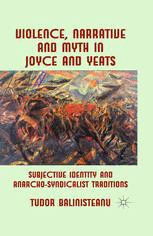
Violence, Narrative and Myth in Joyce and Yeats: Subjective Identity and Anarcho-Syndicalist Traditions PDF
Preview Violence, Narrative and Myth in Joyce and Yeats: Subjective Identity and Anarcho-Syndicalist Traditions
Violence, Narrative and Myth in Joyce and Yeats Also by Tudor Balinisteanu NARRATIVE, SOCIAL MYTH, AND REALITY IN CONTEMPORARY SCOTTISH AND IRISH WOMEN’S WRITING: Kennedy, Lochhead, Bourke, Ní Dhuibhne, and Carr Violence, Narrative and Myth in Joyce and Yeats Subjective Identity and A narcho- Syndicalist Traditions Tudor Balinisteanu University of Suceava, Romania Palgrave macmillan © Mihai Tudor Balinisteanu 2013 Softcover reprint of the hardcover 1st edition 2013 978-0-230-29095-2 All rights reserved. No reproduction, copy or transmission of this publication may be made without written permission. No portion of this publication may be reproduced, copied or transmitted save with written permission or in accordance with the provisions of the Copyright, Designs and Patents Act 1988, or under the terms of any licence permitting limited copying issued by the Copyright Licensing Agency, Saffron House, 6–10 Kirby Street, London EC1N 8TS. Any person who does any unauthorized act in relation to this publication may be liable to criminal prosecution and civil claims for damages. The author has asserted his right to be identifi ed as the author of this work in accordance with the Copyright, Designs and Patents Act 1988. First published 2013 by PALGRAVE MACMILLAN Palgrave Macmillan in the UK is an imprint of Macmillan Publishers Limited, registered in England, company number 785998, of Houndmills, Basingstoke, Hampshire RG21 6XS. Palgrave Macmillan in the US is a division of St Martin’s Press LLC, 175 Fifth Avenue, New York, NY 10010. Palgrave Macmillan is the global academic imprint of the above companies and has companies and representatives throughout the world. Palgrave® and Macmillan® are registered trademarks in the United States, the United Kingdom, Europe and other countries. ISBN 978-1-349-33175-8 ISBN 978-1-137-29158-5 (eBook) DOI 10.1057/9781137291585 This book is printed on paper suitable for recycling and made from fully managed and sustained forest sources. Logging, pulping and manufacturing processes are expected to conform to the environmental regulations of the country of origin. A catalogue record for this book is available from the British Library. A catalog record for this book is available from the Library of Congress. 10 9 8 7 6 5 4 3 2 1 22 21 20 19 18 17 16 15 14 13 To Eldalie Contents Acknowledgements viii Introduction 1 1 Yeats’s Revolving Gyres: A Metaphorical Language for the Modern Experience of Anarchism, Syndicalism, and Political Aesthetics 15 2 Social Myth, Material Reality, and the Aesthetico-Ideological Functions of Art 33 3 The Political Aesthetic of Yeats’s Myth in Anarchist and Syndicalist Contexts 49 4 Social Myth, Literary Narrative, and Political Aesthetics 65 5 Social Myth and James Joyce’s Political Aesthetic 79 6 Social and A nti- social Aesthetic Drives in Joyce, Yeats, and Sorel 95 7 W. B. Yeats, Social Myth, and Monoglossia 111 8 James Joyce, Social Myth, and Heteroglossia 127 9 Heteroglossic Desubjection and Monoglossic Subjection in Joyce, Yeats, and Sorel: Social Myth, Anarchy, and Syndicalism 143 10 Modernism, Myth, Violence, and Social Change 159 11 Modernist Art, Politics, and Social Change: A Sorelian Perspective 179 12 Modernism, Narrative, and Violence 199 Conclusion 219 Notes 227 Bibliography 229 Index 239 vii Acknowledgements This project took shape during a discussion with Dr Finn Fordham at Royal Holloway College, University of London. I am grateful to Dr Fordham for his continuing moral support and for very useful cor- respondence on topics addressed in the book. Professor Nicholas Allen (the Willson Center for Humanities and Arts, University of Georgia) has also helped me stay focused on what has seemed to be a complex and unmanageable set of topics. I will always be indebted to Professor Alice Jenkins (University of Glasgow) for helping me to find a voice of my own. Many people helped in defining the purpose and direction of my arguments, in particular Professor Ortwin de Graef (Catholic University of Leuven), Professor Carle B onafous- Murat (University of Sorbonne Nouvelle), Professor Gert Buelens (Ghent University), Dr John Nash (Durham University), Professor Jonathan Starbrook (University of Manchester), Professor Sascha Bru (Catholic University of Leuven), Professor Hedwig Schwall (KU Leuven Centre for Irish Studies), and Professor Ken Hirschkop (University of Waterloo). I found very stimu- lating the lectures given by Professor Charles Altieri (University of California, Berkeley) and Professor Tyrus Miller (University of California at Santa Cruz), organised by the MDRN research group at the Catholic University of Leuven in spring 2012. The debates and seminars organised by the RIPPLE group at KU Leuven and the Hoover Chair of Economic and Social Ethics at Université catholique de Louvain, Louvain- la-Neuve, were also very inspiring. It would not have been possible to complete this project without the support and understanding of my colleagues at University of Suceava, especially Dr Evelina Graur, Dr Cornelia Macsiniuc, and Dr Valentina Curelariu. The ethos of my research is derived from direct experience of working, as a volunteer, with a number of grassroots environmental groups that adopt anarchist principles in decision making, n on- violent direct action, gender equality, and justice, to name but a few areas of social life. I have learned a lot from participating in the 1995 Walk across Europe for a Nuclear- Free World, organised by For Mother Earth, Ghent, and from working with European Youth Forest Action, Amsterdam, on organis- ing several Ecotopia summer camps. I am especially grateful to Joey viii Acknowledgements ix Rooderkerken for making me understand, through his artisan work, how art can be seen as always implicated in social change. Last but not least, I am thankful to my partner, Laura Manea, for her patience and encouragement throughout all the stages of this project. This research was supported by a grant of the Romanian National Authority for Scientific Research, CNCS – UEFISCDI, project number PN- II- ID- PCE-2011-3-0106.
